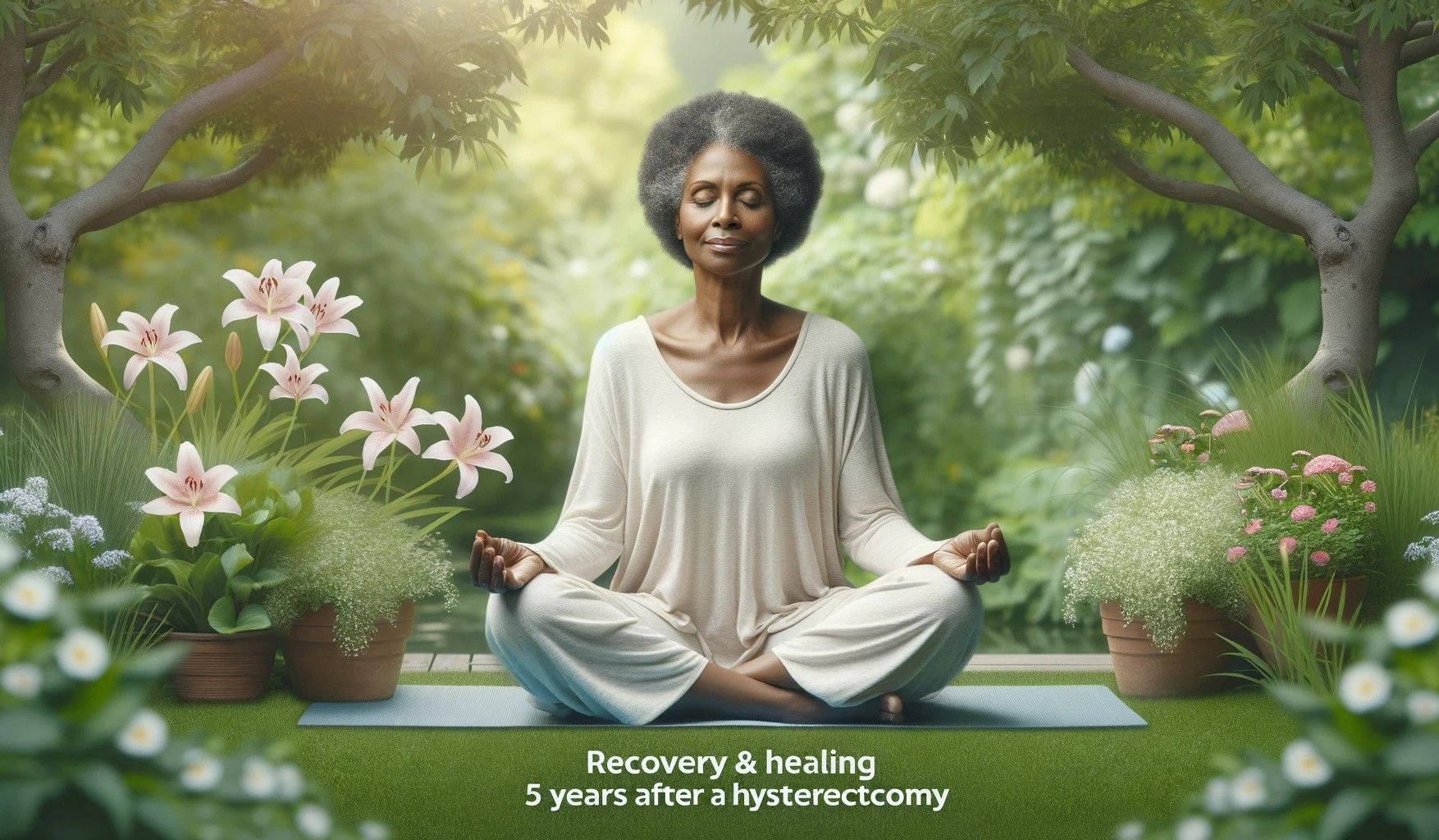5 years after a hysterectomy, women navigate a unique journey of recovery and adjustment to a life without a uterus. A hysterectomy is the most common gynecological surgery globally. Post-operative life is complex, involving recovery, hormonal shifts, and the pursuit of a fulfilling sexual and emotional life.
Over 500,000 hysterectomies are performed annually. 33.3% of women have undergone the procedure by the age of 60. Yet, the narrative doesn’t end in the operation theater; it extends to years of navigating life without a uterus.
Recovery 5 Years Post-Hysterectomy: What to Expect?
Recovery and healing after hysterectomy can vary. But here is what you can expect five years after hysterectomy:
- In most cases, there is no discomfort or fatigue. You will regain your energy and mobility by then.
- Since the ovaries are removed, you will experience meausenopausal symptoms.
- You can resume your normal activities within a few months. Five years after hysterectomy, you will be able to do almost everything that you desire.
Ensure your continued well-being – schedule your appointment now to discuss your recovery and healing five years after your hysterectomy.

- There might be some changes in your sexual functions.
- You should take care of your bone health after menopause, especially if you had early menopause due to a hysterectomy.
Wondering about lifestyle changes? Here's what you should know five years post hysterectomy.
What Activities to Avoid 5 Years after Hysterectomy?
5 years after hysterectomy, you can resume most activities without any restrictions. However, avoid the following things to stay fit and healthy:
- Sedentary lifestyle: Do not keep sitting idle. Always engage in moderate amounts of physical activity.
- Avoid unhealthy foods and maintain a balanced diet.
- Your sexual desires and needs may have changed after the hysterectomy. Do not hesitate to have open communication with your partner.
In general, there are no such restrictions on activities five years after hysterectomy.
Are you still experiencing persistent pelvic pain? Unravel the possible reasons even years after your hysterectomy.
Can I still experience pelvic pain or discomfort years after a hysterectomy?
Yes, it is possible to experience pelvic pain or discomfort years after a hysterectomy. Hysterectomy is a common surgical procedure that is done to address gynaecological issues. This may not always completely resolve pelvic pain. Several factors are responsible for pelvic pain after hysterectomy:
- The formation of scar tissue (adhesions) in the pelvic area can lead to discomfort or pain.
- If your ovaries were not removed during the hysterectomy, Then you may still experience ovarian-related pain.
Take control of your health and well-being. Reach out to us today for answers and support.

- Nerves in the pelvic region can be affected during surgery. This leads to chronic pain.
- Pre-existing conditions like endometriosis or pelvic inflammatory disease. These may persist and cause ongoing discomfort.
- Pelvic pain can sometimes be related to musculoskeletal problems. A hysterectomy does not resolve these.
- Emotional and psychological factors can influence the perception of pain and discomfort.
What types of follow-up care are recommended 5 years after a hysterectomy?

Even 5 years after hysterectomy, it is essential that you continue follow-up care. Here are the key recommendations:
- Maintain regular visits with your gynecologist or healthcare provider.
- Depending on your surgery type, consider periodic pelvic exams.
- If on hormone replacement therapy, monitor and adjust it as needed.
- Assess bone density, especially if you're on long-term hormone therapy.
- Inform your provider of any new symptoms, especially pelvic pain.
- Sustain a healthy lifestyle through diet, exercise, and stress management.
- Discuss heart health and associated risks.
- Prioritize mental and emotional health.
- Discuss options if you still have your ovaries and are sexually active.
Complications after 5 Years: What you need to watch out for post-hysterectomy.
Is there a risk of complications developing 5 years after a hysterectomy?

Yes, there is certainly a risk of developing specific complications like prolapse or incontinence, maybe earlier or five years after hysterectomy. This happens due to changes in pelvic floor support. During hysterectomy, the bladder or bowel may get damaged and cause issues like infection or incontinence.
Hormonal Balance: How does life change without a uterus 5 years later? Read on below!
How does uterus removal affect hormonal balance 5 years after a hysterectomy?

The removal of the uterus during a hysterectomy does not impact hormone levels. Ovaries produce hormones like estrogen and progesterone. Hence, if the ovaries are also removed during a hysterectomy, it can affect your hormone levels. Therefore, the removal of the uterus alone should not lead to a significant change in hormone levels.
If, during hysterectomy, ovaries are also removed, it would lead to menopause. This leads to changes in hormone levels in the body.
Hence, if ovaries are not removed, there will not be any such hormonal disbalances five years after hysterectomy.
Start your journey towards recovery. Contact us today to discuss your hormonal balance and treatment options five years after your hysterectomy.
To HRT or Not: Explore the possibilities of stopping hormone replacement therapy below!
Can I stop taking hormone replacement therapy 5 years after a hysterectomy?

If you were undergoing hormone replacement therapy 5 years after hysterectomy, stopping it depends on several factors.
Whether you should discontinue HRT should be decided upon consultation with your doctor.
- If you see that the menopausal symptoms have subsided 5 years after hysterectomy, then you may consider discontinuing HRT.
- HRT reduces the risk of osteoporosis. Check with your doctor regarding your bone health and density. If everything is alright, then you may stop taking HRT.
- Discuss any cardiovascular effects of long-term HRT use. Consult with your doctor. If you are free of any possible cardiovascular risk, you can stop taking HRT.
- Your overall health and medical history play an important role in the decision. Your doctor will consider any risk factors before allowing you to discontinue HRT.
- Assess your quality of life and well-being with and without HRT. Monitor your daily life, mood, sleep, and comfort with and without HRT. Then, make an informed decision.
Emotional Rollercoaster: Navigating life's ups and downs after 5 years without a uterus.
Emotional and psychological aspects of living without a uterus five years after a hysterectomy

Living without a uterus five years after a hysterectomy can have various emotional and psychological aspects. Many individuals feel relief from health issues after undergoing a hysterectomy. However, some people also experience a range of psychological problems after hysterectomy.
- Adjusting to life without a uterus is an emotional process. You need to come to terms with the changes in the body. Your fertility has also been affected.
- Changes in your body post-hysterectomy might affect your body image. Support and self-acceptance are important.
- If ovaries are removed during hysterectomy, you experience menopausal symptoms. This impacts your emotional well-being.
- Some may experience a sense of loss related to their uterus. This is more specifically true in cases related to their reproductive ability.
- After a hysterectomy, the natural ability to conceive is affected. The hormonal levels might also alter. This causes strain in many relationships. Hence, one should always be open about their feelings to their partners.
The emotional impact of hysterectomy varies from person to person. How one deals with feelings and stress five years after hysterectomy is different for each individual.
Are you confused about diet matters? Find out what you should eat 5 years post-hysterectomy.
Are there any dietary considerations or nutritional needs five years post-hysterectomy?

Even 5 years after hysterectomy, you should manage your diet and health. You should always try to have a balanced and proper diet.
- Focus on calcium and vitamin D for bone health.
- Include dairy, leafy greens, and supplements.
- Maintain a heart-healthy diet with fewer saturated fats.
- Emphasize fruits, vegetables, whole grains, and lean proteins.
- If on HRT, align your diet with your therapy under medical guidance.
- Prevent constipation with a high-fiber diet, including fruits, vegetables, whole grains, and legumes.
- Stay well-hydrated, especially if experiencing hot flashes.
Your well-being is our priority - call us to book your appointment today
Can I resume a normal sexual life five years after a hysterectomy?

Yes, you can typically resume your normal sexual life 5 years after hysterectomy. But before moving ahead, consult with your doctor and discuss the following points:
- Recovery: Ensure you've fully healed from the surgery.
- Address any lingering discomfort or pain that may affect intimacy.
- If you're on HRT, it can impact sexual function. Discuss this with your doctor.
- Consider the emotional aspects of the surgery. Understand its impact on your self-esteem and sexual desire.
- Continue using appropriate protection or birth control methods as necessary.
Can 5 years after hysterectomy recur?
Post-hysterectomy, the recurrence of surgical statistics causes anxiety. Studies indicate varying recurrence rates depending on the type of hysterectomy and the underlying condition it aims to address. For instance, minimally invasive radical hysterectomies have been associated with higher recurrence rates. Particularly in the face of cervical cancer. The surgical approach significantly influences recurrence rates. Open surgery for radical hysterectomy often results in a lower recurrence. It leads to a higher disease-free survival rate at 4.5 years post-surgery. This contrasts with the outcomes of minimally invasive surgical approaches.
The general recurrence rate after an abdominal radical hysterectomy is approximately 4.6%. However, this figure becomes more complex with conditions such as endometrial cancer. Recurrence rates range from 4.4% to 13.7% based on the cancer stage at hysterectomy. Data on these rates weave into a broader story that emphasizes the importance of vigilance. Regular follow-ups and a well-informed approach to health after a hysterectomy are crucial.
Recovery and adaptation after a hysterectomy take a path as individual as the person experiencing it. Knowledge is the guiding force behind every step taken on this journey. With the help of a robust healthcare system, women are empowered to lead fulfilling lives focused on maintaining their health and well-being, even without a uterus. Looking through the statistical lens at recurrence rates and their influencers, we see a story beyond surgery. It's about the resilience and adaptability that define living fully after a hysterectomy.
Reference






